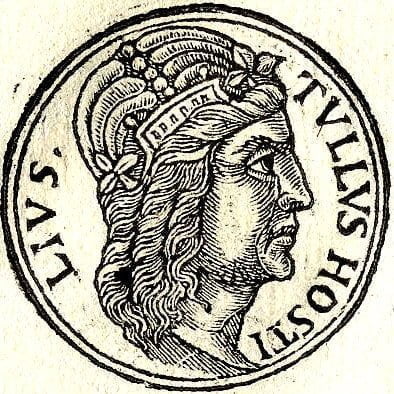Chapters
Tullus Hostilius (Tullus Hostilius) was the third king of Rome. Ruled from 673-642 BCE.
His grandfather was Hostus Hostilius, who fought alongside Romulus and died in the invasion of the Sabines.
Reign
Unlike his predecessor – Numa Pompilius – Tullus was a belligerent ruler. During his reign, Tullus Hostilius waged victorious wars with the Fidenates, Wejent and Sabines.
During his reign, he waged a war with the city of Alba Longa. According to legends, the armies of Rome and Alba fought each other, but no one could get a decisive advantage. To avoid the shedding of brotherly blood (the inhabitants of Rome and Alba Longa were closely related), the war was to be resolved by three brothers’ clashes. The Horatians and the Curiatians stood against each other. Legend has it that the Romans finally won, and Alba Longa became a vassal city of Rome.
Soon after the city’s subjugation, the dictator of Alba Longi – Mettius Fufetius – took action against Rome. When the war broke out between Rome and the Fidenates and Wejent, Mettius betrayed his superiors and went over to the enemy’s side. After the victory, the Romans were sentenced to death by being torn apart with two four-horse harnesses, and the Roman king Tullus Hostilius ordered the demolition of Alba Longa and the resettlement of its inhabitants to Rome and giving them citizenship.
To accommodate new residents, Rome’s borders have been widened to include the hill of Celius. The richest families from Alba Longa received patrician status and could sit in the senate. To this end, Titus Hostilius also commissioned the construction of the Curia Hostilia in which the meetings of the enlarged Roman senate were held. The king ordered the building to be erected in the place where the temple, which had been burnt down in the fire, was previously located.
In keeping with Titus Livius, the king paid very little attention to religious rituals. This approach changed at the end of his reign. One day, from the top of the Albanian Mountains, a voice was heard saying that the people of Alba Longa had forgotten to offer sacrifices to their gods, and therefore the punishment would pass to the Romans. Moreover, Rome was about to be swallowed up by an avalanche of stones from the Albanian Mountains. To prevent this from happening, Tullus organized the ceremony based on the codified religious rules of Numa Pompilius. However, these rites were so inept that furious Jupiter Elicius struck the king of Rome and his house with lightning, burning them completely.
To prevent a future tragedy, a public festival was organized that lasted 9 days – novendialis.







